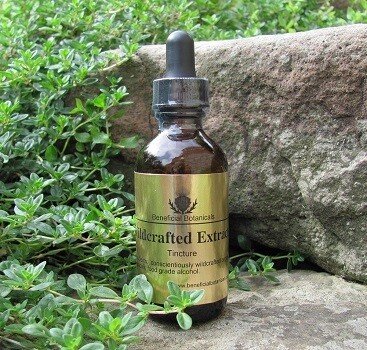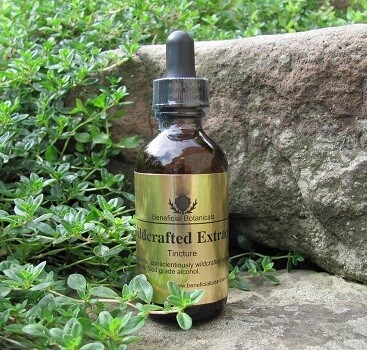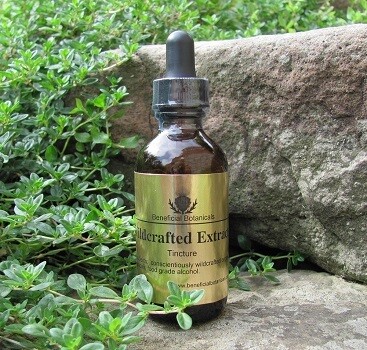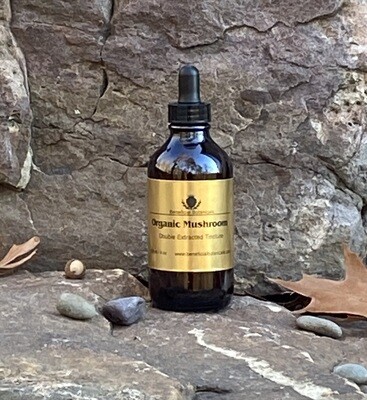Ghost Pipe Tincture
Label: Beneficial Botanicals
Botanical Name: Monotropa uniflora
Other Names: Indianpipe, Indian Ghost Pipe, Indian Pipe, Ghost Plant, Corpse Plant, Pipe Plant, Ice Plant
Parts Used: fresh aerial parts
Harvesting Notes: tincturing begins right at harvest site
Organic: yes
Origin: Blue Ridge Mountains, USA
Tincture Ingredients: fresh Monotropa uniflora, organic alcohol, spring water
[tab name="Benefits"]
The most common uses for Ghost Pipe (Monotropa uniflora) is for physical pain, anxiety, insomnia, migrain headach, and muscle spasms. It is a potent plant and must be used with the upmost respect and thoughtfulness. If you are not familiar with this plant's medicinal properties, it is highly recommended that you read beyond the information provided here.
Above all, pay attention to the warnings, and when dosing start with the minimal amount. If you are the type of person that approaches medicinals with the thought "if a little is good, more is better", it is important that you discard this idea and proceed with exercising caution.
Monotropa uniflora is not a mushroom as some might think but is actually a flowering plant. It does not contain chlorophyll but takes its nutrient energy from certain fungi that in turn have a symbiotic nutrient relationship with trees.
This is a fragile plant which should only be handled sparingly by the harvester, and the roots should be left for sustainability. Skilled herbalists know that the aerial parts must be harvested fresh, and immediately begin the tincturing process right on site.
The unusual color of the tincture is a deep purple and will most likely include particles of the airy plant that are not necessary to filter.
[tab name="Use / Dosage"]
Use, Effects, and Dosage
It is hard to find information on this plant regarding scientific study, other than taxonomy, but we have included some writings from respected herbalists. Still, it is recommended that you continue your own research and consult with a naturopath or other healthcare professional for guidance.
For Physical Pain
Effects: Ghost Pipe addresses intense physical pain by reducing the sensitivity to pain stimuli as an antinociceptive --a sensory input modulator. According to herbalist and ethnobotonist David Winston, it is not your normal analgesic. He describes it as allowing the acceptance of the pain, knowing that it is there, but simply feeling as though you don't care because it raises the pain threshold. He goes on to say, "I find that Ghost Pipe often makes people feel more grounded and present in the moment when their overwhelming pain has been dominating their experience of their bodies and the world."
In the book, "Healing Lyme Disease Coinfections", Stephen H. Buhner includes Indian Pipe as one of the primary herbs for relief from Lyme disease coinfection pain.
Dosage: Most herbalists suggest starting with 3 drops to see if the effects will be felt in 15-30 minutes. According to David Winston, for extreme pain, take up to 20 drops per dose. Stephen H. Buhner noted in his book a dosage recommendation of 30 drops, up to 6 x per day, for Lyme Disease coinfection pain.
For Anxiety and Emotional Pain
Effects: Similarly, as with the description for physical pain, Monotropa uniflora is reported to help with bringing down the intensity of feelings to a level of observation in order to appropriately deal with the cause of the anxiety.
According to renowned herbalist and author Stephen H. Buhner, his experience with Monotropa uniflora to address symptoms of Lyme Disease is as follows: “Indian Pipe tincture combats random bouts of sadness, as well as acute anxiety and panic attacks that result from an overload of sensory data or external input. Therefore, it is often helpful in cases of acute onset of anxiety or panic due to over-stimulation from auditory or visual stimuli, which is not uncommon in people with neurological Lyme disease. It may also reduce the anxiety that occurs when a person is trying to process an overwhelming amount of treatment information, thereby enabling them to make more sound decisions regarding what protocol is best suited for their individual needs.”
Dosage: According to clinical herbalist, Tommy Priester, start with 3 drops of the tincture. If after 30 minutes the effects are not felt, increase the dosage up to 20 drops.
For Insomnia
Effects: Monotropa uniflora tincture can be used to assist with sleep where insomnia is caused by an unsettled worrisome mind and/or physical discomfort. Because of its sedative, nervine, and antispasmodic effects, it may help with falling asleep and waking up without a feeling of hangover. It has been described to assist with "letting go of the worry" for relaxation.
Dosage: Test the dosage needed by starting with 3 drops up to 20 drops. It is reported to take 15 to 30 minutes for the effects to be felt and begin to assist with falling asleep.
For Muscle Spasms
Dosage: unknown
For Migraine or Chronic Daily Headache (CDH)
Dosage: Herbalist and author, Stephen H Buhner recommends a dosage of 30 drops to 100 drops (1 tsp) every few hours.
Precautions
Some sources cite that daily dosing of Monotropa uniflora should not exceed one month.
Not recommended to be taken in conjunction with ADHD medication (stimulants).
Not recommended for children due to unknown safe usage amounts.
Do not operate machinery or drive a vehicle while taking Monotropa uniflora.
[tab name="Precautions"]
May cause drowsiness. Do not take this tincture while operating machinery or driving a vehicle.
Some sources cite that daily dosing of Monotropa uniflora should not exceed one month.
This plant tincture is not compatible with ADHD medication, or other stimulants.
Not recommended for children due to unknown safe dosage amounts.
Overdose, early on-set symptoms, can include blurred vision, dizziness, perspiration, muscle weakness, low blood pressure, hyper-salivation, and paresthesia around the mouth or extremities. Initial management of early overdose symptoms should include the administration of activated charcoal if the ingestion has occurred within the last 2 hours. The dose of activated charcoal is known to be 0.5 to 1 grams per kg of weight in children or 25 to100 grams in adults. Supportive care is usually sufficient for managements.
Drug Interactions: No other information available.
[tab name="References"]
American Herbalist Guild, "Ghost Pipe: A Little Known Nervine"
Health Benefits Times "Ghost Pipe Facts and Uses"
References used from books by Stephen Harrod Buhner, author of "Herbal Antivirals: Natural Remedies for Emerging & Resistant Viral Infections" and "Healing Lyme Disease Coinfections: Complementary and Holistic Treatments for Bartonella and Mycoplasma".
[endtab]
These statements have not been evaluated by the Food and Drug Administration. The information provided here is intended to supplement, not substitute for, the expertise and judgment of your physician, pharmacist or other healthcare provider and should not be construed to indicate that the use of this herbal product is safe, appropriate, or effective for you. Consult your healthcare provider before taking this herbal product.




